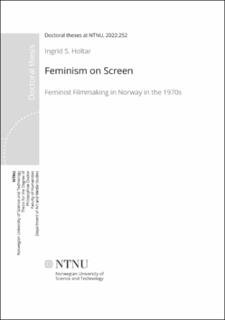| dc.description.abstract | Sammendrag
«Feminism on Screen: Feminist Filmmaking in Norway in the 1970s» er en avhandling om feministisk film og filmkultur i Norge i 1970-årene. Den er formet som en monografi, og er en historisk case-studie – et nærbilde – av feministisk engasjement i norsk film dette tiåret. Studien omhandler primært tolv filmer som tar opp kvinners stilling i samfunnet, og som er regissert av kvinner. Noen av disse filmene er kjente, slik som Hustruer (1975) av Anja Breien og Vibeke Løkkebergs Åpenbaringen (1977). Andre filmer i utvalget har så langt fått liten eller ingen oppmerksomhet, slik som to spillefilmer regissert av Nicole Macé, eller de nær sagt glemte dokumentarfilmene om kvinnebevegelsen som blant annet ble laget for og vist på NRK. Filmene analyseres med perspektiver fra feministiske filmstudier og kontekstualiseres av forskning på norsk filmhistorie, den norske kvinnebevegelsen og den internasjonale filmfeminismen.
Tre forskningsspørsmål styrer avhandlingen: 1. Hvordan ga feministiske filmer form til kvinnebevegelsens agendaer og debatter om kjønn og kvinners rettigheter? 2. Hva gjorde at kvinner ønsket å lage feministisk film, og hva var de sentrale forholdene som muliggjorde denne produksjonen? 3. Hvordan samvirket den feministiske filmen med den øvrige feministiske filmbevegelsen, og hva var de sentrale trekkene ved feministisk filmkultur i Norge i 1970-årene? For å svare på disse spørsmålene bygger avhandlingen på en rekke primærkilder og tar i bruk en blandingsmetode som består av arkivforskning, intervjuer med filmskapere, og tematiske og estetiske filmanalyser.
Avhandlingen viser først og fremst den store bredden i hvordan kvinnelige regissører brukte filmmediet til å gi form til kvinnebevegelsens kampsaker og analyser. Selv om det er stor stilistisk og tematisk variasjon filmene imellom, finnes det også tydelige likheter.For eksempel skaper samtlige av filmene estetisk og narrativt rom for solidaritet mellom kvinner. Et annet viktig funn gjelder de institusjonelle kontekstene for produksjon og visning av film, der det offentlig eide produksjonsselskapet Norsk Film AS, det særnorske kommunale kinosystemet og rikskringkasteren NRK står frem som særlig viktige, dog ambivalente, aktører for feministisk film i Norge. Sist, men ikke minst, løfter avhandlingen fram en feministisk filmoffentlighet som besto av visninger og festivaler, kritikk og debatt dedikert til filmer om og av kvinner. Avhandlingen argumenterer på denne måten for betydningen filmmediet spilte i og for den nye kvinnebevegelsen i Norge.
Summary
«Feminism on Screen: Feminist Filmmaking in Norway in the 1970s» is a dissertation about feminist film and film culture in Norway in the 1970s. It is written in the form of a monograph, and it is a historical case study – a close-up – of feminist engagement in Norwegian film during this decade. The study concentrates primarily on twelve films about women’s position in society, all of which are directed by women. Some of these films are well known, such as Wives (1975) by Anja Breien and Vibeke Løkkeberg’s The Revelation (1977). Other films in the selection have so far received little or no attention, such as the two feature films directed by Nicole Macé, or the almost forgotten documentary films about the new women’s movement which were made for and aired by the public broadcaster, the NRK. These films are analyzed with perspectives from feminist film studies and contextualized with research on Norwegian film history, the Norwegian new women’s movement, and international film feminism.
The dissertation pursues three research questions: 1. How did feminist films give form to the agendas of the new women’s movement and engage the debates on gender and women’s rights? 2. What led women to make feminist films, and what were the central conditions that enabled them to do so? 3. How did feminist films interact with other engagements of the feminist film movement, and what were the central characteristics of feminist film culture in Norway in the 1970s? To answer these questions, the dissertation builds on a variety of primary sources, and adopts a mixed methods approach of archival research, interviews with practitioners, and close thematic and aesthetic film analysis.
First and foremost, the dissertation shows the breadth in how women directors used film in order to engage the struggles and analyses of the new women’s movement. While the films show considerable thematic and stylistic variety, there are also clear similarities between them. For instance, several of the films create spaces both aesthetically and narratively for solidarity between women. Another important find concerns the institutional framework for production and exhibition of film, in which the publicly owned production company Norsk Film AS, the uniquely Norwegian municipal cinema system, and the public broadcaster, the NRK, all appear to have been important, yet ambivalent, agencies for feminist filmmaking in Norway. Last, but not the least, the dissertation makes visible a feminist public sphere for film that consisted of film screenings, festivals, and criticism devoted to films by and about women. In this way, the dissertation argues for the importance that the medium of film played for and within the new women’s movement in Norway. | en_US |
